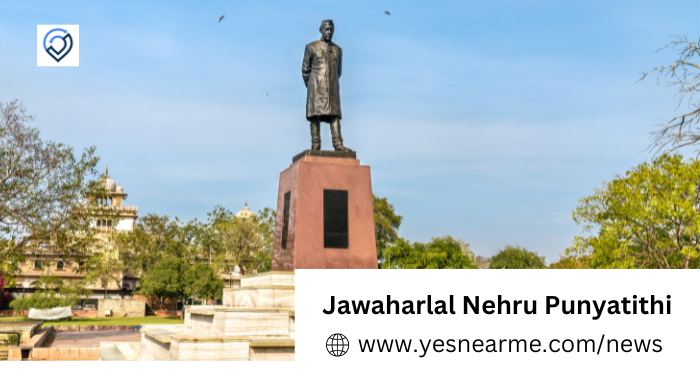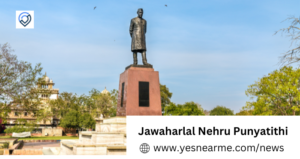Jawaharlal Nehru, the first Prime Minister of independent India, was one of the most prominent figures in the history of modern India. He played a pivotal role in the struggle for India’s independence and in shaping the newly independent nation’s political, social, and economic systems. His vision, leadership, and legacy have influenced not only India but also the global political landscape. Here’s an overview of his life, contributions, and thoughts, covering key aspects of his life, personality, and work.
Early Life and Education
Jawaharlal Nehru was born on November 14, 1889, in Allahabad, India, into a well-off Kashmiri Brahmin family. His father, Motilal Nehru, was a prominent lawyer and a leader in the Indian National Congress, while his mother, Swaruprani, was a caring homemaker. Nehru’s early education was at home under the supervision of private tutors, where he was introduced to English literature, history, and the sciences.
In 1905, Nehru was sent to England to study at Harrow School, a prestigious British institution. His time at Harrow was formative in shaping his ideas about education, and it introduced him to the values of the British Empire and the colonial world. After completing his studies at Harrow, Nehru moved to Trinity College, Cambridge, where he studied natural sciences and graduated with a degree in 1910.
He then went on to study law at the Inner Temple in London, which was a significant decision in his life, as it introduced him to British politics and legal thought. While in England, Nehru became deeply influenced by the writings of Western intellectuals and politicians, as well as by the movement for Indian independence.
Political Awakening
Nehru’s political awakening began in earnest when he returned to India in 1912. He was soon introduced to the Indian National Congress (INC), which was then at the forefront of the struggle for Indian independence. It was under the leadership of figures such as Gopal Krishna Gokhale, Bal Gangadhar Tilak, and, most importantly, Mahatma Gandhi, that Nehru became increasingly involved in the political landscape of India.
In 1916, Nehru met Gandhi for the first time, and their association marked a turning point in Nehru’s life. Gandhi’s philosophy of non-violence and satyagraha (truth and nonviolent resistance) greatly influenced Nehru. Nehru, who was initially more focused on constitutional reforms and legal measures, was won over by Gandhi’s call for a mass-based struggle against British colonialism.
Nehru became an active participant in the Non-Cooperation Movement of 1920-1922, a movement led by Gandhi that sought to boycott British goods, institutions, and titles. Nehru’s involvement in the movement led to his first imprisonment by the British in 1921. It was during his time in prison that Nehru began to develop a deep sense of nationalism and a commitment to the idea of a free, modern India.
Role in the Indian Independence Movement
Nehru’s political rise was closely tied to his growing association with Gandhi. He became a prominent figure in the Indian National Congress and played a crucial role in the civil disobedience movements of the 1930s and 1940s. Nehru was arrested multiple times by the British authorities, and his years in prison only deepened his resolve to secure independence for India.
One of Nehru’s major contributions was his leadership during the Quit India Movement of 1942, when the Congress called for an immediate end to British rule. Although the movement was brutally suppressed by the British, it marked a major step toward independence.
Nehru was also a key player in the negotiations that led to India’s independence in 1947. While Gandhi, the moral leader of the independence movement, had a significant influence on the masses, Nehru was the political leader who articulated the vision of an independent India. His vision was one of a secular, democratic, and modern India that would reject traditional hierarchies and embrace science, technology, and modernity.
Prime Minister of India
On August 15, 1947, India became independent, and Jawaharlal Nehru was appointed as the first Prime Minister of the newly independent nation. Nehru’s leadership during the initial years of independence was crucial in shaping India’s future.
As Prime Minister, Nehru faced a multitude of challenges. One of the most significant was the partition of India, which led to the mass displacement and violence between Hindus and Muslims. Nehru’s leadership during this period was characterized by his call for peace, unity, and tolerance, as well as his efforts to reassure both communities that they would have a place in the new nation.
Nehru’s vision for India was rooted in his belief in secularism, socialism, and democracy. He sought to create a welfare state that would provide for the needs of all citizens, particularly the marginalized and disadvantaged. He was instrumental in crafting the Indian Constitution, which came into force in 1950, and he was a strong advocate for education, science, and industrialization.
In terms of foreign policy, Nehru’s approach was guided by his belief in non-alignment. He sought to position India as a leader in the non-aligned movement, which aimed to stay out of the Cold War power struggles between the United States and the Soviet Union. Nehru also worked to establish India’s leadership in Asia and supported the idea of pan-Asian unity.
Nehru’s Vision for India
Nehru’s vision for India was one of modernization, industrialization, and secularism. He believed that India could only achieve true independence by embracing modern science and technology. To this end, Nehru emphasized the importance of building modern infrastructure, such as dams, roads, and factories, as well as promoting education and scientific research.
Nehru was instrumental in the establishment of institutions like the Indian Institutes of Technology (IITs), which would become centers of excellence in engineering and technology. He also encouraged the growth of a strong public sector, believing that the state should play a central role in economic development.
At the same time, Nehru was a firm believer in secularism and democracy. He opposed any attempt to establish a theocratic or authoritarian government and was committed to creating a society based on pluralism and tolerance. His commitment to secularism was reflected in India’s Constitution, which guaranteed freedom of religion and equal rights for all citizens, regardless of their faith.
Challenges Faced During His Leadership
Nehru faced numerous challenges during his tenure as Prime Minister. One of the most significant was the issue of communalism and religious intolerance. While Nehru championed secularism, India’s diversity and the rise of religious extremism sometimes created tensions between different communities.
Another major challenge was India’s economic development. Nehru’s vision of a mixed economy, where both the public and private sectors played important roles, led to the establishment of large state-run enterprises. However, the country struggled with poverty, unemployment, and slow economic growth during his tenure. Nehru’s economic policies have been debated over the years, with some arguing that they led to the creation of a bureaucratic state that stifled private enterprise.
In terms of foreign policy, Nehru’s idealistic approach to non-alignment was tested during the 1960s. The Sino-Indian War of 1962 was a major blow to his leadership, as India’s defeat by China led to questions about Nehru’s foreign policy and defense preparedness. Nehru’s handling of the crisis, however, did not diminish his standing as a leader in the international community.
Nehru’s Legacy
Jawaharlal Nehru passed away on May 27, 1964, leaving behind a complex and multifaceted legacy. His leadership was instrumental in shaping modern India, and his vision of a secular, democratic, and modern state continues to influence Indian politics and society.
Nehru’s legacy is also defined by his commitment to education, science, and technology. The institutions he established, such as the IITs and the Indian Council of Scientific and Industrial Research (CSIR), have become cornerstones of India’s educational and scientific development.
While Nehru’s economic policies have been criticized for their emphasis on state control, they played a crucial role in laying the foundation for India’s industrialization. His commitment to the welfare of the people and the creation of a modern infrastructure helped India become one of the world’s largest economies.
However, Nehru’s legacy is not without controversy. Some of his policies, such as his handling of the Kashmir conflict and his reliance on the state-led model of economic development, have been subjects of debate. Despite these criticisms, Nehru remains a towering figure in India’s history, and his influence on the country’s political and social fabric is undeniable.
Conclusion
Jawaharlal Nehru was one of the most important political figures of the 20th century, not just in India but globally. His leadership helped shape modern India and laid the foundations for its development as an independent, democratic, and secular nation. Nehru’s commitment to education, scientific progress, and secularism continues to influence India’s policies and society to this day. Despite the challenges and controversies that marked his tenure, Nehru’s legacy as the architect of modern India endures, and his contributions to the cause of global peace and non-alignment are still remembered worldwide


